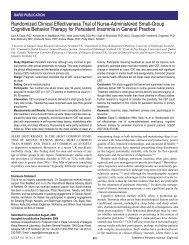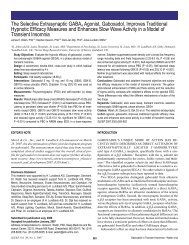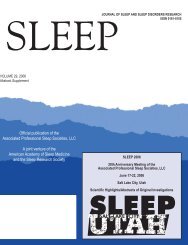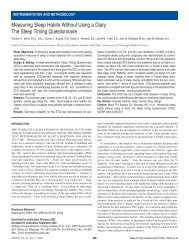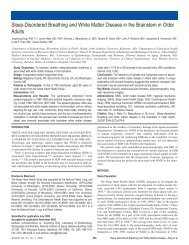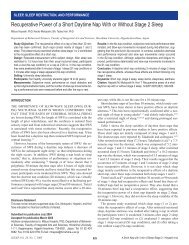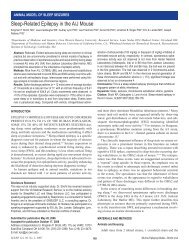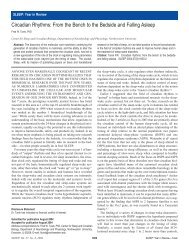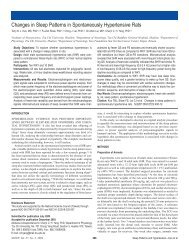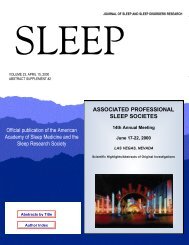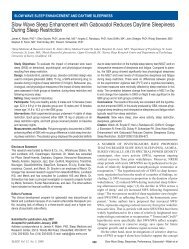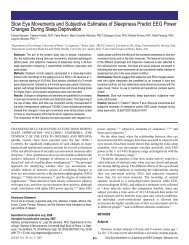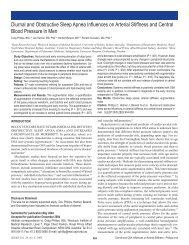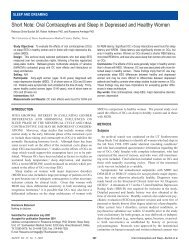SLEEP 2011 Abstract Supplement
SLEEP 2011 Abstract Supplement
SLEEP 2011 Abstract Supplement
You also want an ePaper? Increase the reach of your titles
YUMPU automatically turns print PDFs into web optimized ePapers that Google loves.
B. Clinical Sleep Science V. Sleep Disorders – Movement Disorders<br />
Methods: Data from two 12-week, multicenter, double-blind, randomized,<br />
placebo-controlled studies (XP052 and XP053) of subjects<br />
with moderate-to-severe primary RLS were retrospectively pooled for<br />
analyses of novel sleep endpoints (comparing GEn 1200mg and placebo<br />
groups). Subjects were divided into subgroups based on response<br />
to item 4 on the International Restless Legs Scale at baseline: severe/<br />
very severe or moderate-to-no sleep disturbance. Two novel sleep endpoints<br />
were derived using the sponsor-developed 24-Hour Patient RLS<br />
Record: sleep time (ST) and time awake during the night (TAN); these<br />
endpoints were compared with similar endpoints derived using the Pittsburgh<br />
Sleep Diary (PghSD): total sleep time (TST) and wake time after<br />
sleep onset (WASO).<br />
Results: The integrated, modified intent-to-treat population comprised<br />
427 subjects (GEn 1200mg=223; placebo=204). At baseline, 43.8%<br />
and 56.2% of subjects reported severe/very severe and moderate-to-no<br />
sleep disturbance, respectively. In the severe/very severe sleep disturbance<br />
subgroup, GEn 1200mg decreased TAN compared with placebo<br />
at Week 12/early termination (ET) (unadjusted mean [SD] change from<br />
baseline: -17.2 [175.36] minutes for placebo, -83.1 [177.11] minutes for<br />
GEn 1200 mg; chi-squared value for adjusted mean treatment difference<br />
[AMTD] using nonparametric analysis of covariance [ANCOVA]: 10.9;<br />
P=0.0010); no significant treatment difference was seen for TAN in the<br />
moderate-to-no sleep disturbance subgroup (P=0.8047), or in either subgroup<br />
for ST at Week 12/ET. GEn 1200mg decreased WASO compared<br />
with placebo at Week 12/ET in both subgroups (parametric ANCOVA):<br />
severe/very severe sleep disturbance AMTD: -12.7; 95% CI: -20.35,<br />
-5.15; P=0.0011; moderate-to-no sleep disturbance AMTD: -4.8; 95%<br />
CI: -8.36, -1.15; P=0.0100); no significant treatment difference was seen<br />
in either subgroup for TST at Week 12/ET.<br />
Conclusion: Evaluation of sleep endpoints derived using the 24-Hour<br />
Patient RLS Record and the PghSD yielded similar results.<br />
Support (If Any): XenoPort, Inc., Santa Clara, CA and GlaxoSmith-<br />
Kline, Research Triangle Park, NC<br />
0591<br />
GABAPENTIN ENACARBIL FOR RESTLESS LEGS<br />
SYNDROME: RESULTS FROM INTEGRATED SAFETY DATA<br />
Caivano CK 1 , Lassauzet M 2 , Kavanagh ST 1 , VanMeter SA 1<br />
1<br />
GlaxoSmithKline, Research Triangle Park, NC, USA, 2 XenoPort, Inc.,<br />
Santa Clara, CA, USA<br />
Introduction: Gabapentin enacarbil (GEn) is a non-dopaminergic treatment<br />
under investigation for moderate-to-severe primary Restless Legs<br />
Syndrome (RLS). Subject data were integrated to evaluate the long-term<br />
safety of GEn in adults with RLS.<br />
Methods: Data from the 52-week open-label extension study XP055<br />
and relevant parent studies were integrated to provide long-term safety<br />
information on GEn treatment in RLS. Completers of one of four<br />
double-blind placebo-controlled parent studies (XP052, XP053, XP081<br />
[12-week studies], or XP083 [2-week study]) had the option of participating<br />
in XP055. This summary includes safety data from all subjects<br />
who received GEn in a parent study and all subjects who received GEn<br />
in XP055. GEn was dosed once daily at 5PM with food; this grouping<br />
included 600mg, 1200mg, 1800mg, and 2400mg.<br />
Results: A total of 777 subjects received at least one dose of GEn; mean<br />
(SD) age was 49.3 (12.51) years and 60% were female. Roughly half<br />
of subjects (371/777 [48%]) received GEn for ≥12 months and 74%<br />
(577/777) received GEn for ≥3 months. Total duration of exposure was<br />
highest in the 1200mg group (307.24 subject-years). Somnolence (30%)<br />
and dizziness (22%) were the most frequently reported adverse events<br />
(AEs) in GEn-treated subjects; each led to withdrawal in 2% (18/777)<br />
of subjects. Any AE led to withdrawal of 14% (108/777) of subjects.<br />
Serious AEs were reported by 3% (20/777); none were reported more<br />
than once. Most subjects reported no RLS symptoms or a delay in time<br />
to onset of symptoms based on the 24-hour RLS Symptom Diary at each<br />
assessment (Week 12 [78% (303/390)] - Week 64/65 [87% (151/173)]).<br />
Conclusion: The most common AEs were somnolence and dizziness;<br />
generally these AEs were not treatment limiting. There was no pattern of<br />
earlier RLS symptom onset observed that would suggest augmentation<br />
associated with up to 64 weeks of GEn treatment.<br />
Support (If Any): XenoPort, Inc., Santa Clara, CA and GlaxoSmith-<br />
Kline, Research Triangle Park, NC<br />
0592<br />
AN INTEGRATED ANALYSIS OF 600MG AND 1200MG<br />
DOSES OF GABAPENTIN ENACARBIL VERSUS PLACEBO<br />
IN SUBJECTS WITH MODERATE-TO-SEVERE RESTLESS<br />
LEGS SYNDROME (RLS) PARTICIPATING IN THREE 12-<br />
WEEK TRIALS<br />
Warren S 1 , Kavanagh ST 1 , VanMeter SA 1 , Barrett RW 2<br />
1<br />
Neurosciences, GlaxoSmithKline, Research Triangle Park, NC, USA,<br />
2<br />
XenoPort, Inc., Santa Clara, CA, USA<br />
Introduction: Gabapentin enacarbil (GEn), an investigational nondopaminergic<br />
treatment that provides dose-proportional, sustained<br />
exposure to gabapentin, has demonstrated efficacy in reducing RLS<br />
symptoms. Data from subjects with RLS who participated in three 12-<br />
week trials were retrospectively integrated to evaluate the efficacy and<br />
tolerability of GEn.<br />
Methods: Data from three 12-week, multicenter, double-blind, randomized,<br />
placebo-controlled studies were integrated for the GEn 600mg,<br />
GEn 1200mg, and placebo groups to provide efficacy and tolerability<br />
data on GEn treatment in RLS. Analyses evaluated change from baseline<br />
in the International Restless Legs Scale (IRLS) total score and proportion<br />
of responders on the investigator-rated Clinical Global Impression-<br />
Improvement (CGI-I) scale at Week 12 last observation carried forward<br />
(LOCF). Safety assessments included treatment-emergent adverse<br />
events (TEAEs).<br />
Results: The integrated modified intent-to-treat population comprised<br />
671 subjects (GEn 600mg = 161; GEn 1200mg = 266; placebo = 244).<br />
GEn 600mg improved mean [SD] IRLS total score versus placebo from<br />
baseline to Week 12 LOCF (−13.8 [8.49] versus −9.3 [8.17]; adjusted<br />
mean treatment difference [AMTD]: −4.3; 95% confidence interval [CI]:<br />
−6.01, −2.52; P



